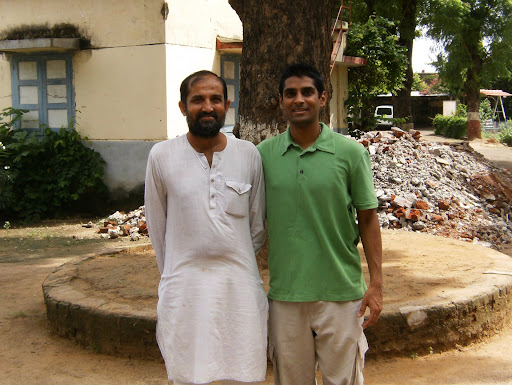 who was eagerly awaiting my visit. Kapilbhai is one of my very few living personal heroes. His principles, the way he works, the way he lives, all deeply resonate with me and I admire him very much. Together last summer we developed an organic certification system for small farmers in Gujarat. Besides being the first and only organic certification in the Gujarati language (which means for the first time ever Gujarati farmers can actually read their issued certificate), there are many other aspects of the system that make it unique in all the world.
who was eagerly awaiting my visit. Kapilbhai is one of my very few living personal heroes. His principles, the way he works, the way he lives, all deeply resonate with me and I admire him very much. Together last summer we developed an organic certification system for small farmers in Gujarat. Besides being the first and only organic certification in the Gujarati language (which means for the first time ever Gujarati farmers can actually read their issued certificate), there are many other aspects of the system that make it unique in all the world.Just being back at the ashram and talking with Kapilbhai again in person, to be in his presence, gave me a wonderful feeling. I also enjoyed hearing him introduce Jatan and our project to some visitors who happened to be there that day. A highlight of this summer was when we were all sitting together, Kapilbhai looked at the visitors and said, "Neil is a great man." I was speechless and barely managed a reply: "No, I'm just lucky". It was one of the most meaningful compliments I've ever received.
I have rarely felt the pride for something I helped create like I did while listening to Kapilbhai talk about our work's guiding philosophies and how they have set us on a different path from what's been done before. To illustrate, he explained that in most certifications, organic agriculture's definition is reduced to farming without chemical fertilizers and pesticides. But JCS has a scoring system that we use to go way beyond this grossly simplified notion of sustainable agriculture. He explained as an example one of the criterias in our scorecard, which says that if your farm uses a tube well, you get 3 marks; if you use a canal, which is a little more sustainable way to get water, you get 5 marks; if you have a farm pond or check dam, that's even a better way to water you field, so that's 8 marks; if you don't water your field at all (that is, it is sufficiently fed just through rain), then you actually have the most sustainable (and advanced) irrigation system, so you get 10 marks. No other certification system in the world tabulates how 'organic' a farm is in this way.
Through the course of the day, there were a couple other nuggets of wisdom that Kapilbhai left me and this group of visitors, which stuck with me:
- "No one is poor until they sit in a car and drive around". This quote sounds weird because I don't remember the whole context of the illustration he was making, but the point was that poverty is a conception, an idea in the mind. You are not poor until you decide that you are poor. In India, as Kapilbhai pointed out, "many people go to sleep at night with an empty belly, but they are happy." To a western person's ears, this is a heinous comment, blasphemous. But I think there is something deep in it. The very definition of happiness, what it means for each person on the earth, is a very relative thing. We assume that a person must have a certain way of life to be happy, but happiness is a slippery thing. Sometimes you mean to bring about 'development' in a community, but you may introduce as many (or more) problems than you solve. Like in the "Gods Must Be Crazy".
- "If you've achieved short term success with a rural development project, you've done something wrong." Kapilbhai believes that working with a rural community is a lifelong task. It takes giving yourself fully, giving your life, to the cause and die trying to make a difference. For him it's the only way to roll: all out. I wouldn't take his quote literally, but what it means to me is that this work is not about cute little summer projects. If you are really commited to farmers and making a difference for them, you need to live with them and work as one of them. There are no shortcuts, and you shouldn't be in it for the awards or recognition or anything else like that. I couldn't agree more. I know that my way of working is exactly what he's railing against, and I am just too damn attached/scared/egotistical to go all out. But maybe one day.
Hi Neil, that is really a great experience. I've been also thinking something similar about global development and frankly my inability right now to be truly impacting in that field.
ReplyDeleteAlthough my heart is there, I'm still holding on to the idea of sitting in an office in SF and leading efforts that have impact in India.
This is not truly possible, just as your teacher says. I must live in the villages to know the people and to truly change their lives.
This is why Gandhi-ji is the father of India, b/c he did this w/o a second thought. Like you, I am just too attached to my life to where going out to the villages seems like a "sacrifice." One day, maybe I will be able to transcend this weakness.